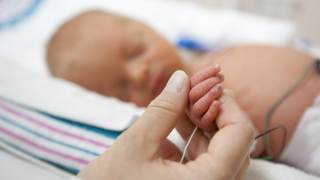Multiple abortions linked to premature births, study shows
- |

The results from a long-term and broad study have linked repeat abortions to mothers giving birth prematurely, the BBC reports this morning.
The study suggests that the more abortions a woman has before giving birth to a child, the more likely it is that the child will be born prematurely.
Babies born prematurely are at higher risk of infection, hypothermia and death.
The report, published in the Journal Human Reproduction, claimed that the overall risk was still low, even though the data showed that women were three times more likely to have a very premature baby (born before 28 weeks) if they had previously had 3 or more abortions.
Results of the study
The study spanned data from 300,858 first-time mothers in Finland for over ten years – 1996 to 2008.
According to the study, there were three babies born before 28 weeks for every 1,000 women who had never had an abortion.
For women who had three or more abortions, the number rose to 11 premature births per 1000 women.
The majority of the abortions in the study were not late-term; 91% were performed before 12 weeks gestation.
Lead researcher Dr Reija Klemetti from the National Institute for Health and Welfare in Helsinki said:
“Our results suggest that induced abortions before the first birth, particularly three or more abortions, are associated with a marginally increased risk during the first birth.”
Besides the link between abortion and premature births, the researchers also suggested the possibility that surgical abortions increase the risk of infections, which would also affect future pregnancies.
Comments
“To put these risks into perspective, for every 1000 women, three who have had no abortion will have a baby born under 28 weeks," said Dr Klemetti.
“This rises to four women among those who have had one abortion, six women who have had two abortions, and 11 women who have had three or more.”
Dr Klemetti also pointed out what these findings mean for other countries:
“Finland has one of the lowest rates of induced abortion in Europe, but even so, a large number are carried out every year.
“In addition, Finland has good quality abortion and maternity care, and in other contexts, particularly in poorer countries, the situation may be different.
“For these reasons, even a very small increase in the risk of poor birth outcomes could have significant health implications, as preterm births and low birth weight can have serious, adverse effects on the health and well-being of both babies and mothers.”
England and Wales have seen a rise in the number of women having multiple abortions, as the BBC reported in May of this year.
Andrew Whitelaw, professor of neo-natal medicine at the University of Bristol, said:
"While pre-term birth before 37 weeks' gestation exposes an infant to a modest but definite increased risk of a range of serious problems including brain injury and death, birth before 28 weeks exposes the infant to a hugely increased risk of death, brain injury and permanent disability.
"Thus an increase, after three or more abortions, of nearly threefold in the odds of having an infant born before 28 weeks is worrying.
"The steadily increasing survival of very pre-term infants should not be interpreted as a solution to the problem of pre-term birth.”
Dr Klemetti suggested that the risks to women and children need to be openly acknowledged professionally and included in any sex education.
“We suggest that the potential for increased risks for subsequent births should be included in sex education, especially as there are other, good reasons to avoid induced abortions.
“Health professionals should also be informed about the potential risks of repeat abortions.”
Andrea Williams, CEO of Christian Concern, commented:
“The data showing the risks of abortion to both mothers and babies are increasing every year.
“This study is simply another example and serves as a stark reminder that we must do all we can to bring down the spiralling rates of abortion in the UK.”
Sources
Resources
